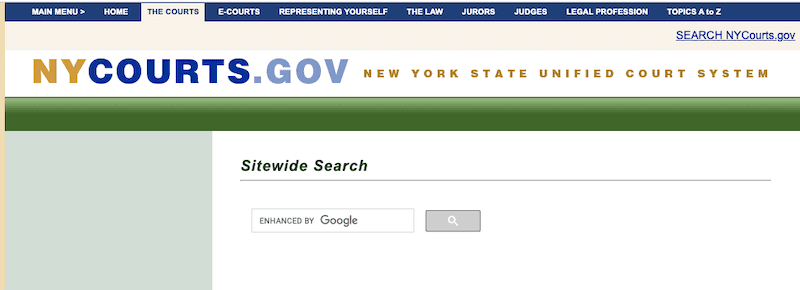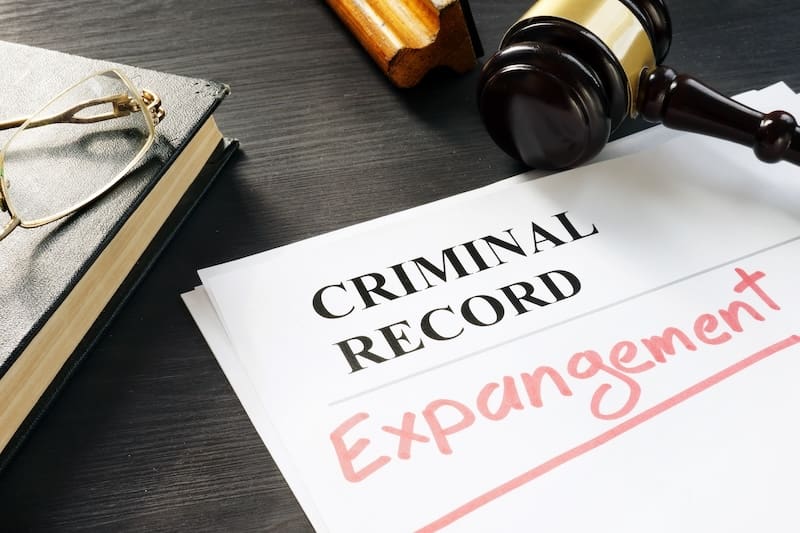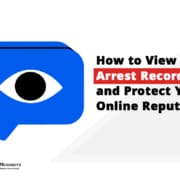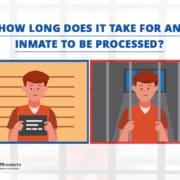How to View Arrest Records and Protect Your Online Reputation
This article discusses how to view arrest records and criminal records online. We also offer strategies for removing them from search results.
Today, so much of your personal information is online. That includes your full name, phone number and home address. Additionally, your financial data, family member information and even your arrest and criminal records are on the internet.
What happens when someone searches for your name or your business’ name and comes across your arrest history, criminal records, or mugshot? It can cause serious damage to your personal or professional online reputation.
Regardless of the outcome of the arrest, people will make a snap judgment about you. This can affect everything from getting hired for a job, getting into college, connecting with someone on an online dating site, or running a successful business.
Why People Look Up Individuals or Businesses Online
There are a number of reasons why people look up other individuals or businesses online, including:
- Competition: It’s common for business professionals to analyze other businesses and professionals in their niche for competitive purposes.
- Connection: Many people use the internet to reconnect with those from their past. This includes family members they’ve lost touch with and old classmates.
- Curiosity: The user is curious about a person they met and wants to learn more about their background and online reputation.
- Networking: Some people turn to Google to find ways to connect with those they want to network with.
- Safety Concerns: If someone is concerned about you for a legal or safety reason, they will often search for your name online to see if their concerns are correct.
- Verification: Employers and clients may look you up on Google to verify your credentials. They may also check out your business reviews and otherwise verify your legitimacy.
From getting in touch with an old flame to running a background check on a potential employee, there are numerous reasons why people look others up online. Unfortunately, if they find negative content about you, such as arrest records, criminal records and mugshots, the opportunity could be ruined in an instant.
In this article, we’ll go over how to find arrest and criminal records online. We’ll also discuss different methods for removing them for the sake of salvaging your digital reputation.
At RemoveMugshots.com, our removal services will erase your online criminal records and mugshot images from the internet fast. Contact us today at 844-935-1118 to learn more.
Arrest Records Explained

Whenever someone is arrested for a crime, there’s a record of the arrest, regardless of what came of it. The arrest record will contain personal information about the arrestee, such as:
- Full name
- Birthdate
- Booking photos
- Fingerprints
Additionally, the arrest record will detail the arresting agency, the time and date of the arrest, and any charges that were filed.
An arrest record is not the same as a criminal record. Arrest records list details of the arrest event; criminal records detail the individual’s convictions. Not everyone who is arrested is convicted of a crime.
However, it’s important to note that mugshot sites, data brokers and people search websites may include all sorts of background information about an individual, including both their arrest and criminal records.
Are Arrest Records and Criminal Records Public?
Yes, it’s common for arrest and criminal records to be public, meaning they’re accessible to anyone in the general public who seeks them out. In some jurisdictions, there are protections for non-public offenses, minors, or sealed records, but generally, arrest and criminal records are part of the public record. According to Nolo, in the U.S., you can almost always go to a state agency’s or court’s website to search for a person’s arrest or criminal records.
Are Arrest Records and Criminal Records Accurate?
No, public records and court records are not always accurate. This is why it pays to review your online arrest and criminal records to ensure they have correct information.
Even if you’re going to attempt to have them taken down, that process can take a while. In the meantime, it’s in your best interest to ensure the data is accurate so nobody searching for you gets the wrong impression.
For example, a police officer may accidentally attach someone else’s arrest record to your name if the two parties have the same name. Or, if your wallet’s been stolen and a person commits a crime with your identification on them, their crime could be pinned to you due to identity theft.
Public Records and Court Records vs. Reputation?

If your arrest or criminal records are available to the general public, they can affect your online reputation — both personally and professionally — in a number of ways.
Personal or Professional Impact
When your arrest record is visible on the internet, your career opportunities and personal relationships can be harmed. When a business partner, client, employer, family member, friend or romantic partner finds your arrest information online, they may want to distance themselves from you. They may no longer trust you or they may be worried about how being involved with you will affect their reputation.
Business Consequences
In addition to destroying your reputation as a business professional or head of a company, your negative information can also wreak havoc on your business and those related to it.
Customers, clients, shareholders and employees may think of the business differently and decide they can no longer trust it. You could lose business and clear the way for competitors to take advantage of your tarnished reputation.
Search Results
People love juicy information. If a lot of people are searching for you online — maybe you’re active on various dating sites or you’re the face of your brand — your arrest and criminal records may be viewed over and over.
By accessing your arrest data so much, that information will rise higher and higher in search engine results, which makes your mugshot and other arrest info even more prominent. High-ranking content is more difficult to remove than low-ranking content because Google considers it valuable to users.
Accessing Arrest Records and Criminal Records

There are a number of ways to access your arrest and criminal records online. Let’s go over them.
People Search Databases
Conducting a simple online search — entering your name into Google — is an easy way to get the process started. If your arrest or criminal records are online, they’re likely to pop up on a number of mugshot and public record websites. While you may not be able to see your full profile on these sites without creating an account and paying a fee, knowing your information is there in the first place is key to having it removed.
Keep a running spreadsheet of all the sites where you found your personal information. Include a link that goes directly to your profile. This is better than going back to the site over and over to find your profile. Doing that will only signal to search engines that your profile is popular, which can make it appear even higher in search results.
Government Websites
Another place to find your arrest information online is on the arresting agency’s website. Commonly, this is where mugshot sites and data brokers get their information. If people-search sites have your info, it’s likely they got it from combing government and law enforcement sites.
Typically, a court, government or law enforcement site will have a court records search by identifiers like your name or date of birth.

Again, add this information to your spreadsheet instead of regularly going to the link to view your record.
Background Checks
To get a full-scope idea of what information there is to find about you, consider hiring a background check service. Since some people may do this when vetting you — such as a potential employer, school administrator or someone you met on a dating site — it’s helpful to know exactly what they’ll be able to find.
In addition to finding your arrest and criminal records online, running a background check on yourself can uncover any other negative information that could be affecting your digital reputation.
The removal experts at RemoveMugshots.com will analyze search engine results. We’ll find and remove your personal information and booking photos online. Call us at 844-935-1118 for more information.
Managing Arrest Records and Criminal Records

Now that you’ve found and cataloged your online arrest and criminal records, it’s time to take steps to have them removed. In some cases, you may be able to wipe the internet of the information entirely. Other times, suppressing them in search results will be your only course of action.
Sealing or Expungement
In the best-case scenario, your court records will be either sealed or expunged. Here’s what that means:
- A sealed record continues to exist, but it’s hidden from the public. While courts and law enforcement agencies will be able to access it, the public won’t.
- An expunged record is removed as if it never happened in the first place.
Either way, you would be able to show public databases proof of sealing or expungement. This may convince them to remove your data to avoid legal trouble. While it’s not always an option, this is often the best way to get a site owner to agree with your request.
Contacting Websites
Whether or not you were able to have your court records sealed or expunged, you’ll need to contact each website and ask that they remove your information. This can be a long and frustrating process, as it can be difficult to get in touch with the site owner and get them to agree to the removal. Even if they do agree, there’s no guarantee that they’ll remove your data or that it won’t reappear on the site in the future.
Remember, these sites get a lot of traction from criminal cases. If it could negatively impact their site traffic, they’re a lot less likely to cooperate with you.
Suppressing Results

In some cases, negative search results for your name will continue to surface. Maybe you didn’t have any luck getting site owners to agree to remove the data. Or, even if they did, it can be a while for Google to catch up and remove those results from the search engine.
Suppressing negative content, especially related to criminal cases, is sometimes the best way to combat this. Regularly create positive and neutral content online, such as blog posts and social media content. This will organically push down those older, negative results.
Most people only pay attention to the top results when searching online. Backlinko found that the top organic search result on Google has an average CTR of 27.6% and is 10x more likely to be clicked than the No. 10 result. Plus, the top 3 Google search results get more than 54% of all clicks.
If you’re able to rank neutral or positive content in those top spots and suppress negative information to at least the second search engine results page (SERP), it’s possible that very few people will ever find your arrest records or criminal records on Google.
Hiring Professionals
Not having luck contacting the people-search databases and having them remove your content? Consider working with an online reputation management (ORM) company. These services are able to find your information online, request the removal of the data, and suppress any search results that contain negative information.
Additionally, ORM companies will continue to monitor your online presence. That way, if the arrest or criminal records or mugshots reappear online, you’ll know immediately, and the removal process will begin.
We work on behalf of our clients to erase mugshots, arrest or criminal records, police reports and other personal information online. Give us a call at 844-935-1118 to get started.
Final Thoughts: Online Public Records

To recap, a ton of your personal data is online, including your brushes with the law and any criminal cases from your past. And all of that data can cause a lot of problems in your life.
Finding and assessing your records for accuracy are the first steps toward cleaning up your online reputation. Then, you can speak with the court, website owners and ORM professionals about your options for removing or suppressing that information.
Additionally, regularly creating online content can affect search engine results. Unflattering information about you will be seen far less than before.
At RemoveMugshots.com, we offer removal services to get rid of damaging information online. We’ll help you rebuild your personal or professional reputation. Whether you have arrest records, criminal records, mugshots or police reports that are causing harm, we’ll work on your behalf to remove them from search results.
It doesn’t matter if you were found guilty or if your charges were expunged, dismissed or dropped, either. Our removal strategies will erase or suppress negative content from showing up on mugshot websites and in search engine results.
Do you need help removing your arrest or criminal records, mugshots or police records from search results? Get a free mugshot removal analysis today and sign up for a consultation with an expert. Learn more here.




